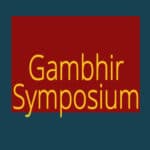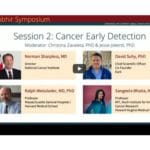Blog
Posts Tagged ‘early cancer detection’
Don Listwin Award For Outstanding Contribution to Cancer Early Detection 2022 goes to: Sudhir Srivastava, Ph.D., MPH, MS
November 16, 2022

The Don Listwin Award for Outstanding Contribution to Cancer Early Detection recognizes a sustained contribution to, or singular achievement in, the cancer early detection field.
The 2022 Award goes to: Sudhir Srivastava, Ph.D., MPH, MS: Senior Scientific Officer and Chief of the Cancer Biomarkers Research Branch in the Division of Cancer Prevention, National Cancer Institute (NCI), National Institutes of Health (NIH).
He is well-known for having established a number of transformative programs on translational research on cancer screening, early detection, risk assessment and enabling technologies including artificial intelligence with a network of leading experts in medicine, science, computational biology that has advanced scientific discoveries and revolutionized diagnostics in cancer early detection.
In 2000, Dr. Srivastava developed and implemented a novel approach to collaborative clinical research on cancer biomarkers through the establishment of the Early Detection Research Network, a flagship program at the NCI that has begun translating biomarkers into clinical tests (> 8 FDA approved and > 19 CLIA certified) for early detection. This network has been a pioneer in applying innovative technologies in the validation of cancer biomarkers as well as in the development of a national informatics infrastructure to support the research.
He also developed a number of strategic programs that promotes the convergence of interdisciplinary approaches from physics, biology, chemistry, and engineering emphasizing seamless integration of these disciplines into innovations, team science and translation from the bench to the bedside. These include EDRN, the Alliance of Glycobiologists, the Liver Cancer Consortium, the Liquid Biology Consortium, the Pancreatic Cancer Early Detection Consortium, the Cancer Imaging and Biomarkers Program, and the PreCancer Atlas. His conceptualization and implementation of the EDRN informatics infrastructure, in collaboration with NASA’s Jet Propulsion Laboratory, has become a model for similar collaboration established at the NIH. He is respected as an early adapter of emerging technologies, in particular, artificial intelligence initiatives he launched in 1994, before the science became omnipresence in the life sciences and a vital approach in today’s world of enhancing human capabilities. He has successfully developed partnerships on shared interests with the National Institute of Standards and Technology, DOD’s Center for Prostate Disease Research, DOE’s Pacific Northwest National Laboratory, and the Jet Propulsion Laboratory. In addition, he has developed collaborations with international and non-profit foundations, such as Japan’s Agency for Medical Development and Research, Cancer Research-UK, the China Cancer Institute/Chinese Academy of Medical Sciences, and U.S. organization such as Pancreatic Cancer Action Network, Lustgarten Foundation, and Kenner’s Family Research Foundation.
In recognition of his leadership in cancer diagnostics, Dr. Srivastava was featured in Wired magazine in August 2003, and more recently, has been awarded a Distinguished Public Service Award (2016) by the American Pancreatology Association, a Distinguished Clinical and Translational Proteomics Award (2017) by HUPO International, and the Distinguished NCI Cancer Prevention Fellowship Program (CPFP) Alumni Award (2016).
* Excerpt taken from https://www.earlydetectionresearch.com/award/
Don Listwin Award For Outstanding Contribution to Cancer Early Detection 2021 goes to Rebecca Fitzgerald, MD, FMedSci
October 11, 2021

The Don Listwin Award for Outstanding Contribution to Cancer Early Detection recognizes a sustained contribution to, or singular achievement in, the cancer early detection field.
The 2021 Award goes to: Rebecca Fitzgerald MD FMedSci, MRC Cancer Unit, University of Cambridge and an internationally recognized pioneer for her exceptional research into the prevention and detection of oesophageal cancers.
This award was announced at the recent Early Detection of Cancer Conference – EDx21.
This award is given to recognize and thank Rebecca for the work she has done to develop, grow and establish the research needed to detect cancer early.
She is the Interim Director of the MRC Cancer Unit, Hutchison-MRC Research Centre, Professor of Cancer Prevention, and Clinician Scientist leading research in the Early Detection of Cancer for the University of Cambridge and the CRUK Alliance for Cancer Early Detection (ACED). Rebecca is known for the development of the Cytosponge technology, a sponge on a string that patients can swallow instead of undergoing an endoscopy. The Cytosponge collects cells from the oesophagus for staining, which can flag the presence of TFF3-positive cells indicative of Barrett’s oesophagus, a precursor to oesophageal cancer. Recently Rebecca and her team published work demonstrating that Cytosponge increases the identification of Barrett’s in individuals with frequent heart-burn symptoms by 10-fold compared to standard of care. The building of evidence for its clinical implementation for surveillance of high-risk individuals and in endoscopy sparing due to COVID-19 related pressures on health systems continues to make a vital impact to patients’ lives and is internationally recognized for its contribution towards breaking barriers in research.
Congratulations to Rebecca and we are pleased to have her within the early detection community.
The 2021 Gambhir Symposium (virtual) –celebrating ongoing work of visionary and pioneer Dr. Sanjiv Sam Gambhir
August 6, 2021

The 2021 Gambhir Symposium (virtual) held on July 19, 2021 included discussions and presentations celebrating the continuing work on paths forged by Sanjiv Sam Gambhir, MD, PhD, (1962-2020) in the fields in which he launched new directions:
Molecular Imaging, Cancer Early Detection, Precision Health.
Click Here to see the Conference Agenda & Videos.

Click here to see the videos from the Cancer Early Detection Session.
2021 Virtual PHIND Symposium
April 13, 2021

Dr. DeSimone gestures wearing an Oura monitoring ring, which made the news recently as the company partnered with the National Basketball Association (NBA) to help monitor the health of players.
The 2021 Precision Health and Integrated Diagnostics (PHIND) Center at Stanford held the virtual PHIND Symposium on March 23, 2021. The event showcased the exciting PHIND work that is going on campus-wide, featuring current PHIND investigators and Precision Health experts. Professor of Radiology Dr. Garry Gold gave an update on the PHIND center, reflecting upon former Radiology Chair Dr. Sanjiv Sam Gambhir’s visionary leadership and the continuation of this work, now with Dr. Gold’s direction, aimed at monitoring health to identify early transitions from health to disease.
Discussions included one with Dr. Joseph DeSimone, recently named recipient of the Sanjiv Sam Gambhir Professorship in Translational Medicine, who stated that although he is new to PHiND, his group has been thinking about precision delivery, using new devices such as microneedles to deliver treatments locally, rather than systemically throughout the body. Dr. Utkan Demirci, leading the Canary Center at Stanford, discussed his group’s Exosome-Total-Isolation-Chip (ExoTIC) device for identification of exosome-based biomarkers for monitoring health from a variety of biological fluids.
Besides devices, like the one in the picture, there was a focus on data. What kinds of data are we capturing as the clinical enterprise has transformed through Covid and telehealth? Can we separate patients into cohorts with online and in person visits to optimize the clinical workflows? How can we access and mine data from non-identifiable electronic health records? Participants also discussed ways to ensure equity in access to these devices and data, as well as ways to ensure clinical trial participants are engaged in meaningful ways in monitoring their health.
The Precision Health and Integrated Diagnostics Center (PHIND) at Stanford is dedicated to longitudinal monitoring and improvement of overall human health on a lifelong basis. Stanford advancements in biology and technology are leading to the potential to understand disease risk, detect disease early and enable preventative interventions.
Click Here to watch the videos from the Symposium.
Canary Foundation’s Ovarian Cancer Initiative: moving forward with matching specimen and imaging tissue in 3D
March 8, 2021

The Canary High Grade Serous Ovarian Cancer (HGSC) study is leveraging the expertise and resources of four institutions to study the microenvironmental factors that can lead fallopian tubes to develop this deadly type of ovarian cancer and thus provide a signal to alert for the presence of early disease. The Fred Hutchinson Cancer Research Center in Seattle, the University of Pennsylvania, the Van Andel Institute in Michigan, and the University of California San Francisco have built the infrastructure to share fallopian tube specimens, experimental and clinical data, and analytical teams.
The small pilot study goals are to ask whether it is possible to compare women carrying the BRCA mutations (who are at higher risk of developing ovarian cancer) compared to those who do not carry the mutation and determine whether it is possible to find a measurable difference in the microenvironment.
Based on their first results, the team is selecting a larger set of specimens, matched for clinical factors and BRCA mutation status, and will conduct RNA, DNA and methylome sequencing. The group is also comparing competing platforms for imaging the tissue expression in 3D so that differences along the length of the tube can be evaluated and tested for correlations with the genetic data.
Sanjiv Sam Gambhir, pioneer in molecular imaging, Director of the Canary Center at Stanford for Cancer Early Detection, dies at 57
July 21, 2020
From Stanford University News:
 Sanjiv Sam Gambhir, MD, PhD, professor and chair of radiology at the Stanford School of Medicine and an internationally recognized pioneer in molecular imaging, died July 18 of cancer. He was 57. He was a global leader in advancing techniques for molecular imaging and early cancer detection.
Sanjiv Sam Gambhir, MD, PhD, professor and chair of radiology at the Stanford School of Medicine and an internationally recognized pioneer in molecular imaging, died July 18 of cancer. He was 57. He was a global leader in advancing techniques for molecular imaging and early cancer detection.
Below is the message that Lloyd Minor, MD, dean of the School of Medicine, shared with the community on July 18.
Words cannot express what an immense loss this is personally, for our Stanford community, and for the field of medicine.
Sam was an uncommonly talented physician-scientist. As the Virginia and D.K. Ludwig Professor in Cancer Research and director of the Molecular Imaging Program at Stanford (MIPS), Sam earned international recognition as a pioneer of molecular imaging. He authored nearly 700 peer-reviewed articles, several books, filed for 40 patents, and his lab’s work has been featured on dozens of journal covers. But Sam was most proud to see many of his discoveries translate to the clinic, which today benefit patients around the globe.
To many of us, however, Sam was much more: a dear friend. His kindness, sense of humor, and graceful way with people were among his defining qualities and will be sorely missed by those who knew him.
I first met Sam in 2012 when he was serving as co-chair of the search committee that selected me to be Dean. It was then that I immediately understood why he is so revered at Stanford Medicine and across the university. As a leader and as a person, Sam exemplified through his life the best of Stanford and the highest values to which we aspire.
Many of us witnessed Sam’s courage and tenacity during the 21 months that he and his wife Aruna fought for the life of their son Milan, who passed away in 2015 at the age of sixteen. Sam understood the fragility of human health and worked every day to apply his genius to research focused on diagnosing disease in its earliest and most treatable stages.
Sam was an advocate for precision health long before it was popularized. In recent years, he dedicated his life to the early detection of cancer as director of the Canary Center for Cancer Early Detection at Stanford. In 2016, he established the Precision Health and Integrated Diagnostics (PHIND) Center to help create the future he envisioned for health care—a world in which technologies continuously monitor our health to keep us healthy.
Throughout his prolific career, he mentored more than 150 postdoctoral fellows and graduate students. These leaders, representing more than ten disciplines, will carry on his legacy.
I hope that we may come together as a community, virtually and in spirit, to support each other during this difficult time and to share our memories of Sam—a scientific visionary, a trusted mentor, a beloved colleague and friend.
In lieu of flowers, the Gambhir family prefers donations to the PHIND Center, the Canary Center for Cancer Early Detection at Stanford, the Ben and Catherine Ivy Foundation, or The Sanjiv Sam Gambhir Professorship in Translational Medicine.
Sincerely,
Lloyd Minor
Canary Foundation congratulates Dr. Sanjiv Sam Gambhir on receiving the 2020 European Society of Molecular Imaging award.
July 6, 2020

From the Stanford press release:
Sanjiv Sam Gambhir, MD, PhD, the Virginia and D.K. Ludwig Professor for Clinical Investigation in Cancer Research and Chair of the Department of Radiology, has received the 2020 European Society of Molecular Imaging (ESMI) annual award.
“The Committee recognizes Sam as one of the founding fathers of the field in which we all have the privilege to work. He has been a pioneer and visionary, a mentor and inspiration – thanks for your continuous and passionate dedication for imaging science.”
The ESMI Award is given to an excellent scientist for her/his outstanding contribution to the interdisciplinary research in Imaging Science. The nominee must have contributed significantly to the knowledge in this field.
Congratulations, Dr. Gambhir!
Ovarian Cancer Early Detection: Screening at Stanford School of Medicine
February 7, 2013
On behalf of the Canary Center at Stanford for Cancer Early Detection and the Stanford Cancer Institute, the Canary Foundation is supporting the search for candidates to participate in the Novel Markers Trial Ovarian Cancer Screening Test. This is an important new research study looking at markers in the blood that may be used as an early detection test for ovarian cancer. If you fit the criteria, please consider joining the effort to reach the vision of living in a world of simple tests that identify and isolate cancer at its earliest, most curable stage.
 Candidates are needed who fit the following criteria:
Candidates are needed who fit the following criteria:
- Healthy women
- Ages 45-80
- Have at least one ovary
If you are willing to donate one tube of blood and fill out a questionnaire once a year for two years, we’re looking for you! If you have three of the following risk factors you may qualify:
- Of Ashkenazi Jewish descent
- Never given birth to a child (this counts as two risk factors)
- Never had a tubal ligation
- Used hormonal contraception (birth control pills) for less than a year in your life
If you are interested in learning more, please contact the research study office at novelmarkers@stanford.edu or call (650) 724-3308. For general information about participant rights, contact 1-866-680-2906.
In Memory: Lawrence Viariseo, Canary Challenge Rider and Cancer Early Detection Advocate
January 29, 2013
 Lawrence Viariseo survived a fall off of a tall cliff, and fought a brave battle with cancer before his passing in late January. He raised funds for the Canary Challenge in 2012. His service is being held February 9, 2013 in Palo Alto, California.
Lawrence Viariseo survived a fall off of a tall cliff, and fought a brave battle with cancer before his passing in late January. He raised funds for the Canary Challenge in 2012. His service is being held February 9, 2013 in Palo Alto, California.
Mr. Viariseo asked for friends or family members to donate to the Canary Challenge in lieu of flowers.
His niece Megan Cox describes him this way, “As you may remember, my uncle was a paraplegic who had beat stage 4 bladder cancer once before. The doctors at Stanford he felt had saved his life. It meant the world to him to be entering into the challenge in 2012 to give back to those doctors.”
CLICK HERE to make a donation to honor his memory. Please write a personal note if you would like.
Here is a lovely article that ran last year regarding his story, and his commitment to the Canary Challenge.
Cancer Early Detection in 2012: Spirit of the Holidays!
December 13, 2012
We’re so grateful for all of the contributions by scientists, donors, and everyone who participated in the work of cancer early detection in 2012! We sincerely thank our donors, volunteers, scientists, and clinicians for their hard work and support- we couldn’t do it without you! Watch the slideshow below for a look back at all of Canary’s successes and milestones in 2012.
